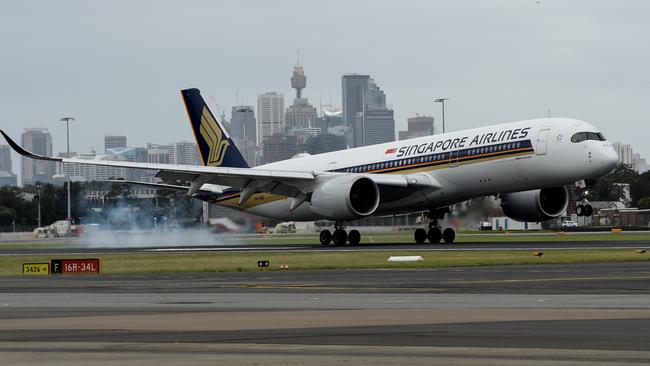Singapore Airlines warns Australia border talks need to begin now
Singapore Airlines has warned discussions need to start now on how Australia will reopen its borders if processes are to be put in place by December.

Singapore Airlines has warned that Australia will not be ready to reopen borders when vaccination rates hit 80 per cent unless the government starts engaging with industry now on how travel can resume.
Hopes are growing that international travel will restart in December with Qantas scheduling flights to a number of destinations, including Singapore, Los Angeles, London and Tokyo.
Singapore Airlines regional vice-president Louis Arul said talk about reopening was driving up expectations but added that there had been little discussion on how to enable it. He said the airline still didn’t know what the requirements would be for departing passengers, how they would be enforced or whether any quarantine would be necessary on return.
“The engagement is important because there’s still a lot of gaps in what we see as the planning for border openings,” Mr Arul said.
“The vaccination rate is very, very promising (but) we believe there needs to be some engagement between authorities to ensure all touch points, all contact points are Covid-safe.”
Of particular concern was the lack of uniformity among airports with regard to vaccination of workers.
Although some airports like Sydney and Canberra had mandated vaccination for high-risk staff at a minimum, others like Melbourne, Brisbane and Perth were merely “encouraging” workers to get the jab.
Mr Arul said Singapore Airlines crew members were all fully vaccinated, and there was a concern that they could be interacting with unvaccinated workers at Australian airports.
“If you don’t impose the regulation, operations will continue but staff will become uncomfortable,” he said. “We’ve had staff express discomfort working with other staff who are not vaccinated so these things need to be taken care of.”
He also warned of the need to consider the potential for “bottlenecks and crowding” at airports, as flying ramped up and more people began travelling.
“Even though you are vaccinated there’s probably still a need at the start to ensure there’s no long queues and big crowds gathering together because we’ve all seen that even though you’re vaccinated the virus can still move around,” Mr Arul said.
“How do we ensure that? There’s been no discussions with the airports and airlines to ensure that.”
Nor had there been any discussion about the requirements for PCR tests to show a traveller did not have Covid before boarding a flight, he said.
“If that is going to be the case, is there sufficient testing capacity available? These things all need to be discussed and put into place before the border opens.”
Throughout the pandemic Singapore Airlines has continued to operate into Australia despite shrinking passenger caps, with 3600 flights bringing 70,000 people back home.
In addition the flights have carried thousands of tonnes of freight, including exports of meat and lobsters and imports of medical supplies and the Pfizer vaccine.
Mr Arul said it was a strategic decision by the carrier to maintain flights to Australia throughout the Covid crisis, because of the importance of the market.
The continuity of service also meant it would be easier to ramp up as demand returned.
“On Singapore Airline’s side, we are quite confident we are ready (for border reopenings) because we have been dealing with many international authorities with a myriad of requirements and we’ve put in place a framework to deal with this,” Mr Arul said.
“I would expect that Australia’s measures will not be very different from the rest of the world. There may be some variations but largely the blueprint is there.”






To join the conversation, please log in. Don't have an account? Register
Join the conversation, you are commenting as Logout